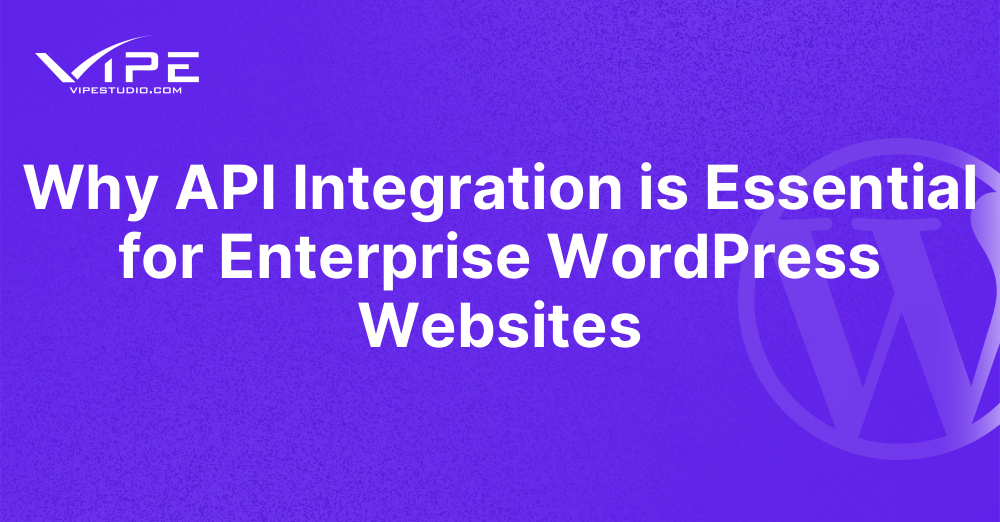15.01.2025
WordPress Development
Why API Integration is Essential for Enterprise WordPress Websites
READING TIME: MIN
Table of Content
As enterprises increasingly rely on digital platforms to drive operations, the need for seamless connectivity between systems becomes critical. API integration allows WordPress to function as a central hub, connecting with various third-party tools and services to enhance functionality, streamline workflows, and improve user experiences. In this article, we’ll explore the importance of API integration for enterprise WordPress websites and how it helps businesses stay competitive.
Understanding API Integration in the Context of WordPress
An API (Application Programming Interface) acts as a bridge that allows different software applications to communicate with each other. For WordPress, API integration means leveraging tools like the REST API or GraphQL to enable real-time data exchange between the website and external platforms.
For enterprises, this capability unlocks possibilities such as synchronizing data across CRM systems, integrating e-commerce platforms, and automating complex workflows, all while using WordPress as a powerful content management system.
Enhancing Functionality with Third-Party API Integrations
One of the key benefits of API integration is the ability to extend WordPress’s functionality by connecting it with other platforms. Popular use cases include:
- E-commerce Integration: Connecting WordPress with platforms like Shopify or WooCommerce to create feature-rich online stores.
- Marketing Automation: Integrating tools like HubSpot or Mailchimp for email campaigns, lead tracking, and customer engagement.
- Social Media Management: Linking with social platforms to automate sharing, track engagement, or display dynamic social feeds.
- Payment Gateways: Enabling secure and diverse payment options through APIs like Stripe or PayPal.
These integrations empower enterprises to build websites that are more than just static pages—they become dynamic, interconnected systems.
Streamlining Workflows with API-Driven Automation
Efficiency is paramount for enterprises, and API integration helps streamline workflows by automating repetitive tasks. Examples include:
- Data Synchronization: Automatically updating customer data between WordPress and CRM systems like Salesforce or Zoho.
- Content Syndication: Distributing content to multiple platforms, such as mobile apps or partner websites, from a single WordPress instance.
- Order Processing: Syncing orders between WordPress and inventory management systems to improve accuracy and reduce manual effort.
By reducing manual intervention, API-driven automation saves time and minimizes errors, allowing teams to focus on strategic initiatives.
Improving User Experience Through Connected Systems
API integration also plays a critical role in enhancing user experiences. Enterprises can use APIs to deliver personalized, real-time interactions, such as:
- Dynamic Content Display: Showing location-based offers or personalized recommendations by integrating APIs from analytics or geolocation services.
- Advanced Search Functionality: Connecting WordPress with Elasticsearch or Algolia to deliver faster, more accurate search results.
- Unified User Accounts: Providing single sign-on (SSO) experiences by integrating authentication APIs like OAuth or SAML.
These capabilities ensure that enterprise websites meet modern user expectations for speed, convenience, and customization.
Challenges to Consider in API Integration
While API integration offers significant benefits, enterprises must address certain challenges:
- Security Risks: Improperly secured APIs can expose sensitive data. Enterprises should implement strong authentication and encryption measures.
- Performance Impact: Poorly optimized API calls can slow down website performance, affecting user experience.
- Integration Complexity: Connecting multiple systems requires careful planning to avoid conflicts and ensure compatibility.
By working with experienced developers, enterprises can mitigate these risks and unlock the full potential of API integration.
Why Choose Vipe Studio for API Integration Services?
At Vipe Studio, we specialize in crafting seamless API integrations for enterprise WordPress websites. Our expertise includes:
- Custom API development to meet unique business needs.
- Integration with popular platforms like CRM systems, e-commerce tools, and payment gateways.
- Optimizing API calls for performance and reliability.
- Comprehensive security measures to protect data and maintain compliance.
If your enterprise is ready to enhance its digital capabilities, contact Vipe Studio today for tailored API integration solutions.
Conclusion: Empowering Enterprises with API Integration
API integration is no longer a luxury but a necessity for enterprises aiming to build competitive, scalable, and user-centric digital platforms. By connecting WordPress with external systems, businesses can unlock new functionalities, streamline workflows, and deliver exceptional experiences to their users. Partnering with experts like Vipe Studio ensures that your API integrations are efficient, secure, and aligned with your enterprise goals.
More on The Topic
- The Dark Side of WordPress Plugins: A Provocative Exploration
- The Human Cost of Poor WordPress Architecture
- Governance, Ownership, and Responsibility in WordPress Projects
- Product Thinking in WordPress Development
- WordPress Architecture Decisions and Their Business Impact
The content of this website is copyrighted and protected by Creative Commons 4.0.



